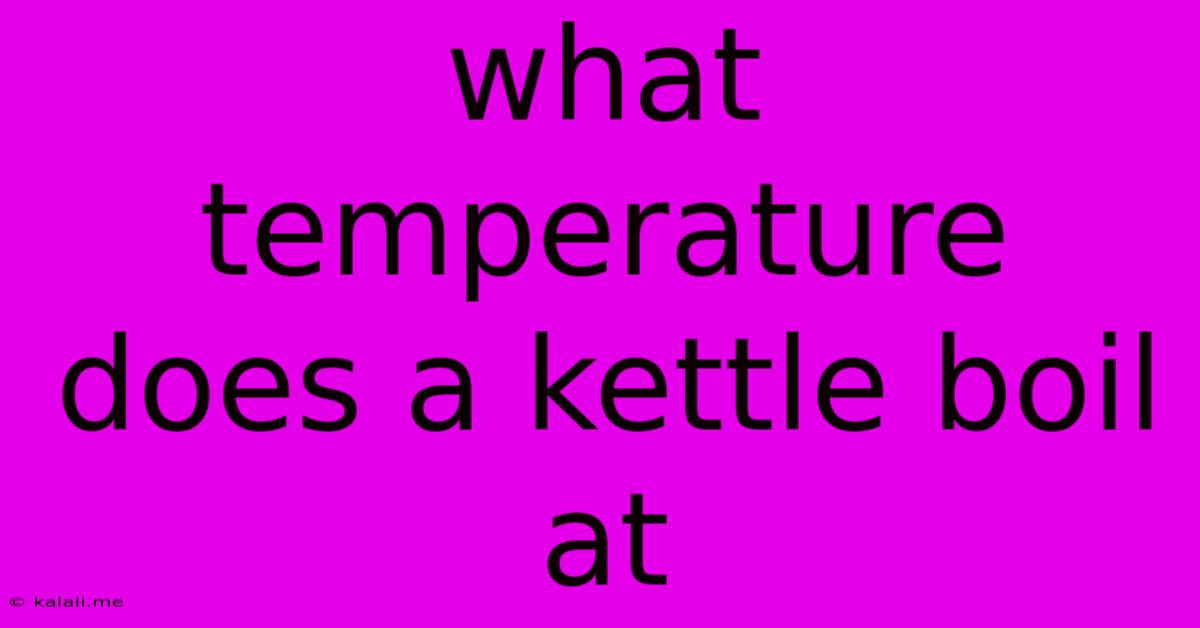What Temperature Does A Kettle Boil At
Kalali
May 19, 2025 · 3 min read

Table of Contents
What Temperature Does a Kettle Boil At? A Deep Dive into Boiling Points
Meta Description: Discover the exact temperature at which water boils in a kettle, the factors influencing this temperature, and why understanding boiling points is important. Learn about altitude, atmospheric pressure, and more!
Boiling water is a fundamental part of our daily lives, from making tea and coffee to cooking pasta. But have you ever stopped to think about the precise temperature at which a kettle boils? While the answer seems straightforward, several factors influence the boiling point of water, making it a more complex topic than you might initially expect.
The Standard Boiling Point: 100°C (212°F)
Under standard atmospheric pressure (1 atmosphere or 101.325 kPa), water boils at 100 degrees Celsius (212 degrees Fahrenheit). This is the temperature at which the vapor pressure of water equals the atmospheric pressure surrounding it, allowing water molecules to transition from liquid to gas (steam) freely. This is the temperature you'll typically see on a thermometer when your kettle is vigorously bubbling.
Factors Affecting Boiling Point: Beyond the Basics
Several factors can affect the precise boiling point of water in your kettle:
-
Altitude: At higher altitudes, atmospheric pressure is lower. This means water boils at a lower temperature. For example, at high mountain peaks, water might boil at temperatures significantly below 100°C. This is why cooking times can be longer at higher altitudes – the lower boiling point means food takes longer to cook thoroughly.
-
Atmospheric Pressure: This is directly related to altitude. Any changes in atmospheric pressure, whether due to altitude or weather systems, will affect the boiling point. A high-pressure system might result in a slightly higher boiling point, while a low-pressure system will result in a slightly lower one.
-
Impurities in Water: While the effect is minimal, dissolved minerals and other impurities in water can slightly alter its boiling point. Highly mineralized water, for instance, might boil at a fraction of a degree higher than pure water.
-
Type of Kettle: The material of your kettle itself won't significantly change the boiling point of water, but the design and efficiency of the heating element can influence how quickly the water reaches 100°C.
Why Understanding Boiling Point Matters
Understanding the boiling point of water is important for various reasons:
-
Cooking: Achieving the correct cooking temperature is crucial for many recipes. At higher altitudes, you might need to adjust cooking times or even use a pressure cooker to compensate for the lower boiling point.
-
Science Experiments: Precise temperature control is essential in many scientific experiments involving water. Understanding the factors that affect the boiling point is crucial for accurate and repeatable results.
-
Safety: Boiling water is a potential hazard. Knowing the boiling point helps you understand when water is at its most dangerous temperature and take the necessary precautions.
Conclusion: More Than Just 100°C
While 100°C (212°F) is the standard boiling point of water, it’s crucial to remember that this is under specific conditions. Altitude, atmospheric pressure, and even water purity can slightly alter this temperature. Understanding these factors gives you a deeper appreciation for the physics behind a seemingly simple process – boiling water in a kettle. This knowledge can prove invaluable in cooking, scientific endeavors, and everyday safety.
Latest Posts
Latest Posts
-
True Or False Weight Is A Force
May 19, 2025
-
Twixt The Cup And The Lip
May 19, 2025
-
Throughout Heaven And Earth I Alone Am The Honored One
May 19, 2025
-
New Brakes Squeak When Stopping Slow
May 19, 2025
-
How Often Should Spark Plugs Be Changed
May 19, 2025
Related Post
Thank you for visiting our website which covers about What Temperature Does A Kettle Boil At . We hope the information provided has been useful to you. Feel free to contact us if you have any questions or need further assistance. See you next time and don't miss to bookmark.